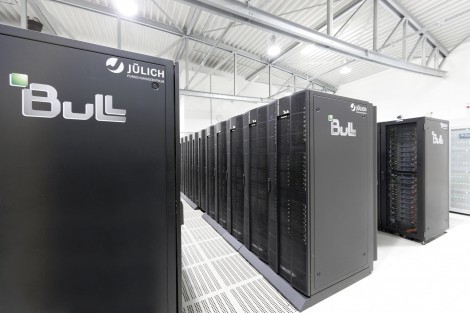ITER NEWSLINE
114
High performance computing for fusion
Krista Dulon
High performance computing for fusion

One hundred thousand billion operations per second: the High Performance Computer For Fusion in Jülich, Germany.
The computing power of HPC-FF, for High Performance Computer For Fusion, is a valuable new tool for plasma physicists. Modelling requires extensive computer resources; increasingly realistic simulations that are able to take into account the full ITER plasma—and not just a part—will accelerate fusion research, and pave the way for optimum operation of ITER. "Up to now, fusion researchers—when they were lucky enough to have access to a supercomputer—competed for computer time with other research domains," explains Sibylle Günter from the Max-Planck Institute for Plasma Physics in Garching. "Demonstration runs were possible in most cases, but parameter studies for advanced understanding and better prediction for ITER were not easy to do."
HPC-FF has a total computing power of 101 teraflops, meaning that it can treat approximately one hundred thousand billion operations per second. It can also access the resources of another Jülich computer, JuRoPA, for a total processing power of 300 teraflops. These exceptional resources will be used by researchers to increase understanding of turbulent behaviour in fusion plasmas, interaction of energetic particles with the plasma, edge physics, MHD stability, and material degradation—covering larger computational domains (up to an entire reactor) than ever before.
FZE Jülich was charged through an EFDA implementation agreement with constructing and operating the machine. Building the computer took six months, with another three required to reach full performance and regular remote operation. Since its launch on 1 August 2009, demand for the computer has exceeded available computer time by 30 percent. Projects are chosen by the HPC-FF Board through an annual call for research proposals. A team of experts in applied mathematics and computer science has also been formed to improve the performance of existing computer codes and develop new numerical techniques to make the most efficient use of the new supercomputer.
Experience gained on the HPC-FF supercomputer will prepare the way for the next-stage device, the first petaflop supercomputer (more than 1000 teraflops) that is planned for the International Fusion Research Centre (IFERC) in Rokkasho, Japan in 2012. The ultimate goal, says Sibylle, is "to provide physicists with the tools to simulate all relevant processes in a magnetic fusion device, just as a flight simulator helps airplane pilots to fly."
European Commission press release
Thanks to Sibylle Günter, director at IPP Garching, for her contribution to this article.
return to Newsline #114


